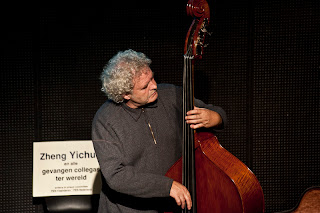The following poem gave the title to the book which will be presented January 27, GEDICHTENDAG in den Hopsack, Antwerp
In één adem
Vier de lente, de liefde niet.
Verzoen mijn lippen, groei mij aan
als de lente vergeefs wordt en bitterder.
Weer koesteren bomen landhonger,
drijven vogels de winter uit
de baaierd van april.
Ook dit zout, oud zeer, kennen we.
En zoals minnaars en vleermuizen blindvliegen,
geven dromen zich zelden bloot.
Met dit vermoeden leefden we;
het vuur aan de schubben, de schuimlippen.
Ooftbomen gloeien wit.
Wij sterven langzamer af -
droesemig, meestal achter glas.
Of zoals bloesem, in één nacht. *
In einem Atemzug
Fei’re den Frühling, die Liebe nicht
Entküss’ meine Lippen, verwachse mit mir
wenn das Frühjahr vergebens und bitter
Wieder … Bäume mit Hunger nach Land
treiben Vögel den Winter heraus
das Durcheinander des April’
Auch diese salzig’, alte Seelennarbe kennen wir
Und wie Liebende und Fledermäuse in Blindheit fliegen
Geben Träume sich selten nackt.
Mit diesen Ahnungen lebten wir,
das Feuer an den Schuppen, die Schaumlippen
Obstbäume verglühen zu Weiß.
Wir sterben langsamer ab –
Heruntergeflockt und abgesetzt, meist hinter Glas
Oder als Blüten während einer Nacht. *
In one breath
Celebrate spring, not love
appease my lips, grow on me
when spring turns in vain and more bitter.
Once more trees cherish hunger for land,
drive birds out of winter
the hustle bustle of April.
Also this salt, this old pain, we know.
And like lovers and bats blindly fly,
dreams seldom bare themselves.
With these inklings we lived;
fire at the fins, the frothy lips.
Fruit trees glow white.
We slowly decline -
dregs of wine, usually behind glass.
Or like the blossom, in one night.









